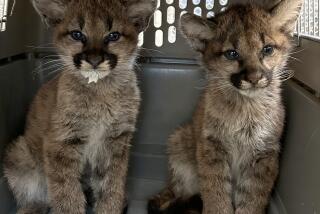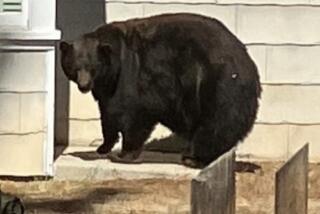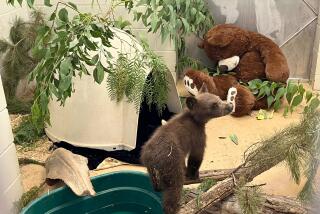Researchersâ Kamchatka Cub Feared Dead
MOSCOW â Rosie, one of three brown bear cubs released into the wilds of the Kamchatka Peninsula in the Russian Far East by two Canadian researchers, has disappeared and apparently fallen victim to a male bear that preys on cubs.
Rancher Charles Russell and artist Maureen Enns, who set the siblings free in 1997 as part of an experiment in building trust with wild bears, said Rosie has not appeared in the Kambalnoye Lake study area since Russell arrived in mid-June.
The other two cubs, Chico and Biscuit, appeared to be in good health and have remained together since they emerged from hibernation--just as they did last year, Russell and Enns said.
Russell came to his grim conclusion about Rosie after watching a predator bear devour a cub from another family, then try to catch Chico and Biscuit in a harrowing chase that covered more than four miles across the snow.
âWe think the sad truth is that she got caught by the killer bear,â Russell and Enns said in an interview by e-mail from Kamchatka.
Russell and Enns, who have spent years studying wildlife on three continents, obtained the three orphaned cubs from a Kamchatka zoo and reintroduced them to the wild. Their goal was to maintain contact with the bears while allowing them to live freely in a nature reserve.
Before Rosieâs disappearance, the three female cubs were inseparable as they roamed the mountains around Kambalnoye Lake. Ever alert for danger, they always traveled together in the same formation, with Chico leading the way, Biscuit in the middle and Rosie acting as rear guard.
The cubs, now more than 2 years old, hibernated on their own during their first two winters--a time when the mother typically shares the den with her offspring. Kamchatka brown bears, the same species as grizzlies in North America, usually stay with their mothers and siblings until they are 3.
While it is possible that Rosie did not survive the long winter or went off on her own, Russell and Enns believe that the evidence points to the cannibal male bear that roamed the area in the spring preying on cubs weakened by hibernation and a lack of food.
In a posting to their Web site, https://www.norquay.com/grizzlies, which Enns and Russell maintain from Kamchatka, Russell describes watching in horror as he saw the male bear in hot pursuit of Chico and Biscuit one day in June.
Russell was too far away to tell which cub was which, but as they ran across the frozen lake, the adult bear gained on one cub and nearly caught her. The other cub cut across the path of the big bear, distracting it long enough for her sister to escape. Russell said he suspects that Rosie lost her life in a similar encounter.
âI could clearly see that they are still very committed to each other, and Iâm quite sure that Rosie had not yet lost this commitment,â he said.
More to Read
Sign up for Essential California
The most important California stories and recommendations in your inbox every morning.
You may occasionally receive promotional content from the Los Angeles Times.










